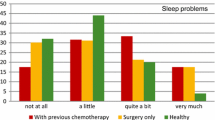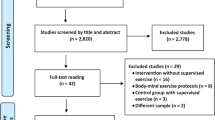Abstract
To examine the effects of different doses and types of exercise on sleep quality in breast cancer patients receiving chemotherapy. A multicenter trial in Canada randomized 301 breast cancer patients between 2008 and 2011 to thrice weekly, supervised exercise during chemotherapy consisting of either a standard dose of 25–30 min of aerobic exercise (STAN; n = 96), a higher dose of 50–60 min of aerobic exercise (HIGH; n = 101), or a combined dose of 50–60 min of aerobic and resistance exercise (COMB; n = 104). The secondary sleep outcomes in the trial were assessed by the Pittsburgh Sleep Quality Index (PSQI) at baseline, twice during chemotherapy, and postchemotherapy. We analyzed the global PSQI and the component scores. Repeated measures analyses of variance indicated that the HIGH group was statistically superior to the STAN group for global sleep quality (mean group difference = −0.90; 95 % CI −0.05 to −1.76; p = 0.039) as well as subjective sleep quality (p = 0.028) and sleep latency (p = 0.049). The COMB group was borderline statistically superior to the STAN group for global sleep quality (mean group difference = −0.76; 95 % CI +0.11 to −1.62; p = 0.085) as well as sleep duration (p = 0.051); and statistically superior for sleep efficiency (p = 0.040), and percentage of poor sleepers (p = 0.045). Compared to a standard volume of aerobic exercise, higher volumes of both aerobic and combined exercise improved some aspects of sleep quality during breast cancer chemotherapy. Exercise may be an attractive option to manage sleep dysfunction in cancer patients during chemotherapy.


Similar content being viewed by others
References
Savard J, Ivers H, Villa J et al (2011) Natural course of insomnia comorbid with cancer: an 18-month longitudinal study. J Clin Oncol 29:3580–3586
Palesh O, Peppone L, Innominato PF et al (2012) Prevalence, putative mechanisms, and current management of sleep problems during chemotherapy for cancer. Nat Sci Sleep 4:151–162
Berger AM (2009) Update on the state of the science: sleep-wake disturbances in adult patients with cancer. Oncol Nurs Forum 36:E165–E177
Kripke DF, Langer RD, Kline LE (2012) Hypnotics’ association with mortality or cancer: a matched cohort study. BMJ Open 2(1):e000850
Mishra SI, Scherer RW, Snyder C et al (2012) Exercise interventions on health-related quality of life for people with cancer during active treatment. Cochrane Database Syst Rev 8:CD008465
Mishra SI, Scherer RW, Geigle PM et al (2012) Exercise interventions on health-related quality of life for cancer survivors. Cochrane Database Syst Rev 8:CD007566
Tang M-, Liou T-, Lin C- (2010) Improving sleep quality for cancer patients: benefits of a home-based exercise intervention. Support Care Cancer 18:1329–1339
Youngstedt SD (2005) Effects of exercise on sleep. Clin Sports Med 24:355–365
Courneya KS, McKenzie DC, Mackey JR, et al (2013) Effects of exercise dose and type on physical functioning and symptom management in breast cancer patients receiving chemotherapy: A multicenter randomized trial. JCNI 105:1821–1832
Kline CE, Sui X, Hall MH, et al (2012) Dose-response effects of exercise training on the subjective sleep quality of postmenopausal women: Exploratory analyses of a randomized controlled trial. BMJ Open 2(4)
United States Department of Health and Human Services (USDHHS) (2008) Physical Activity Guidelines for Americans. USDHHS, Washington, DC
Schmitz KH, Courneya KS, Matthews C et al (2010) American college of sports medicine roundtable on exercise guidelines for cancer survivors. Med Sci Sports Exerc 42:1409–1426
Rock CL, Doyle C, Demark-Wahnefried W et al (2012) Nutrition and physical activity guidelines for cancer survivors. CA Cancer J Clin 62:242–274
Buysse DJ, Reynolds CF III, Monk TH et al (1989) The Pittsburgh sleep quality index: a new instrument for psychiatric practice and research. Psychiatry Res 28:193–213
Beck SL, Schwartz AL, Towsley G et al (2004) Psychometric evaluation of the Pittsburgh sleep quality index in cancer patients. J Pain Symptom Manag 27:140–148
Courneya KS, McKenzie DC, Mackey JR et al (2008) Moderators of the effects of exercise training in breast cancer patients receiving chemotherapy: a randomized controlled trial. Cancer 112:1845–1853
Courneya KS, Sellar CM, Stevinson C et al (2009) Moderator effects in a randomized controlled trial of exercise training in lymphoma patients. Cancer Epidemiol Biomark Prev 18:2600–2607
Cella D, Eton DT, Lai J- et al (2002) Combining anchor and distribution-based methods to derive minimal clinically important differences on the functional assessment of cancer therapy (FACT) anemia and fatigue scales. J Pain Symptom Manag 24:547–561
Diggle P, Heagerty P, Liang K et al (2002) Analysis of longitudinal data, 2nd edn. NY, Oxford University Press, New York
Mustian KM, Sprod LK, Janelsins M et al (2013) Multicenter randomized controlled trial of yoga for sleep quality among cancer survivors. J Clin Oncol 31:3233–3241
Yang P-, Ho K-, Chen H- et al (2012) Exercise training improves sleep quality in middle-aged and older adults with sleep problems: a systematic review. J Physiother 58:157–163
Courneya KS, Sellar CM, Trinh L et al (2012) A randomized trial of aerobic exercise and sleep quality in lymphoma patients receiving chemotherapy or no treatments. Cancer Epidemiol Biomark Prev 21:887–894
Sanford SD, Wagner LI, Beaumont JL et al (2013) Longitudinal prospective assessment of sleep quality: before, during, and after adjuvant chemotherapy for breast cancer. Support Care Cancer 21:959–967
Savard J, Simard S, Blanchet J et al (2001) Prevalence, clinical characteristics, and risk factors for insomnia in the context of breast cancer. Sleep 24:583–590
LeBlanc M, Mérette C, Savard J et al (2009) Incidence and risk factors of insomnia in a population-based sample. Sleep 32:1027–1037
Sharma N, Hansen CH, OConnor M et al (2012) Sleep problems in cancer patients: prevalence and association with distress and pain. Psycho-Oncology 21:1003–1009
King AC, Oman RF, Brassington GS et al (1997) Moderate-intensity exercise and self-rated quality of sleep in older adults: a randomized controlled trial. J Am Med Assoc 277:32–37
Tworoger SS, Yasui Y, Vitiello MV et al (2003) Effects of a yearlong moderate-intensity exercise and a stretching intervention on sleep quality in postmenopausal women. Sleep 26:830–836
Acknowledgments
This work was supported by a Grant from the Canadian Breast Cancer Research Alliance. KSC and YY are supported by the Canada Research Chairs Program. YY is also supported by the Alberta Innovates-Health Solutions. CMF is supported by a Health Senior Scholar Award from Alberta Innovates-Health Solutions and through the Alberta Cancer Foundation’s Weekend to End Women’s Cancers Breast Cancer Chair. LT was supported by a Health Studentship from Alberta Innovates-Health Solutions.
Disclosures
None. The authors report no financial relationship with the Canadian Breast Cancer Research Alliance who sponsored the research.
Author information
Authors and Affiliations
Corresponding author
Rights and permissions
About this article
Cite this article
Courneya, K.S., Segal, R.J., Mackey, J.R. et al. Effects of exercise dose and type on sleep quality in breast cancer patients receiving chemotherapy: a multicenter randomized trial. Breast Cancer Res Treat 144, 361–369 (2014). https://doi.org/10.1007/s10549-014-2883-0
Received:
Accepted:
Published:
Issue Date:
DOI: https://doi.org/10.1007/s10549-014-2883-0




